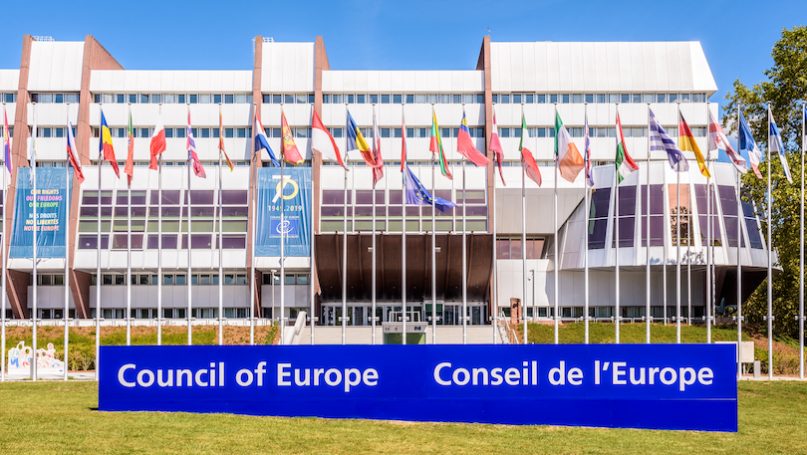
The Committee of Ministers of the Council of Europe decided on 16 March to end the Russian Federation’s membership under Article 8 of the Statute of the Council of Europe – with immediate effect. The day before, the Parliamentary Assembly (PACE) had already unanimously stated in a rare special session that Russia could no longer be a member of the pan-European organisation in view of its illegal war of aggression against Ukraine and the accompanying violation of the Council’s fundamental principles. At the same time, Moscow had already announced its intention to withdraw. In this way, the leadership probably wanted to forestall the looming expulsion. Without success though, because the ministers – the actual decision-making body of the Council of Europe – made use of their option in a hitherto singular act and immediately terminated Russia’s membership. A diplomatic slap in the face in solidarity with Ukraine.
For the Council of Europe, this is a consistent emergency brake. In the past years, the Council had always accommodated Russia. For good reason, one might argue: democracy, human rights and the rule of law must be constantly practised and preserved anew every day in all European countries – and actually around the globe. The Council of Europe’s main purpose is to support them in this and create a binding framework through its more than 200 conventions, especially the most important one, the European Convention on Human Rights.
This common legal space of now remaining 46 member states, which has been slowly growing for more than seven decades, represents the heart of our European way of life. Russia’s gradual integration into it since 1996 has therefore been a decisive step forward for the European project. A success, especially for the benefit of the Russian public, which one justifiably did not want to jeopardise too quickly without a really good reason.
But, it must be stated soberly that President Putin and his clique have abandoned this common European framework of values and law (perhaps long ago, if they ever shared it) and are instead forcing Russia into an open attack against it. The exclusion of the country from the Council of Europe, the supreme institutional protection of these values in Europe, was indeed inevitable. At the same time, however, Europe’s division has become even deeper.
Although Russia’s leadership may have broken with European values and European law, being no longer member of the Council of Europe is all the more tragic for the Russian public. And it was precisely this public that was the focus of the Council’s efforts. The end of membership – Moscow has already announced this – goes hand in hand with, among other things, Russia’s intention to denounce the European Convention on Human Rights and thereby the protection of fundamental human rights by the European Court of Human Rights in Strasbourg (France).
The Russian leadership is thus furthering the erosion of human rights in its own country. It is willfully depriving Russians of the protection from European law and from European public opinion that proceedings before the Court entail. Putin’s Russia has turned away from the Council of Europe, has turned away from Europe and its fundamental values. The crucial question is to what extent this is also the case for the Russian population. Here, there seems to be considerable doubt and glimmers of hope.
What next? Since the channels of communication and cooperation within the framework of the Council of Europe will now also disappear for the foreseeable future, the importance and role of the last relevant European-institutional link with Russia, the Organisation for Security and Co-operation in Europe (OSCE), will continue to increase. Henceforth, it is important to use its potential, which is unfortunately all too often neglected, as comprehensively as possible for conflict management and human rights protection – in Ukraine and beyond. All participating states have an obligation to do so in the spirit of the Helsinki Final Act and the Charter of Paris. However, because Russia’s leadership has used up all trust, informal channels to Russian civil society must be maintained and, especially now, newly created. The Council of Europe and the whole European family must keep the door open to this other Russia.
Therefore, in their statement on the exclusion of the Russian Federation from the organisation, the leaders of the Council of Europe rightly emphasise once again not only solidarity with Ukraine, but also with the Russian people. It expressly remains part of our European family. Putin and his clique are waging war against Ukraine and their own people. For Europe’s future, we must stand by both of them against this madness.
Further Reading on E-International Relations
- Opinion – The European Union’s Status in the Russia-Ukraine Crisis
- Opinion – A Hidden Victory? The Winter War and Russia’s Invasion of Ukraine
- Opinion – On 9 May Putin’s Russia Will Glorify War and Stalin
- Opinion – Russia’s Choices in Ukraine
- Opinion – 2025’s Gas Crisis in the Russia-Ukraine Conflict
- Opinion – Strategic Perspectives on the Russia-Ukraine War